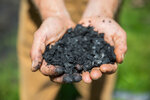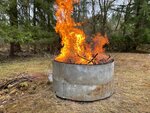


Thanks to a bill signed by Gov. Jay Inslee last month, Toledo-based agroforestry and conservation startup Rake Force can now use flame cap kilns to produce biochar.
The legislation, Substitute Senate Bill 6121, passed unanimously in both the House and the Senate.
“It’s a big win for Rake Force and a big win for conservation efforts throughout the state,” Rake Force co-founder Jake Dailey said of SSB 6121 being signed into law.
A charcoal-like substance made from organic agricultural and forestry waste that is partially combusted with little to no oxygen, biochar is gaining popularity in agriculture as a soil amendment capable of improving soil health and sequestering carbon.
The process to make biochar is laborious and time-consuming, involving burning forest debris in kilns without oxygen, but it creates fewer pollutants than a standard slash pile, and the end product has a wide range of ecological benefits, including soil remediation and water filtration.
“We’re turning a hazardous fuel into a beneficial soil amendment and creating fire security (and) improving food security by improving the soil,” Dailey said of biochar production.
Rake Force has been making biochar out of cleared biomass on a small scale since Dailey and co-founder Brian Dennis started their company in 2021, but the state Department of Natural Resources did not distinguish flame cap kilns from burn barrels, making it impossible for Rake Force to apply for burn permits for larger production.
Burn barrels are illegal in Washington state due to the toxic, low-ground smoke they can generate, according to the state Department of Ecology.
Unlike burn barrels, flame cap kilns, defined as shallow outdoor containers with solid bottoms used to burn natural vegetation, produce minimal air pollutants and benefit the environment by creating biochar.
SSB 6121 formally recognizes flame cap kilns as “a necessary component of an integrated land management strategy that reduces greenhouse gas emissions; produces durable biogenic carbon storage … and minimizes air quality impacts from open burning.”
In addition to creating a burn permit subsection for flame cap kilns, the legislation also allows those who use flame cap kilns for biochar production to earn carbon credits.
“We can develop a small carbon market and let carbon credits be sort of a subsidy to pay for the fuels reduction work that we need to do,” Dailey said.
Dailey worked with the Washington Farm Forestry Association, which employs a lobbyist, ahead of this year’s legislative session to advocate for biochar legislation.
While the bill was ultimately sponsored by 24th District Sen. Kevin Van De Wege, 28th District Sen. T’Wina Nobles and 26th District Sen. Emily Randall, the bill had significant support from 20th District Rep. Ed Orcutt and others in the House.
To read the legislation in full, visit https://app.leg.wa.gov/billsummary?BillNumber=6121&Year=2023&Initiative=false.
For more information about Rake Force, visit https://www.rakeforce.us/.